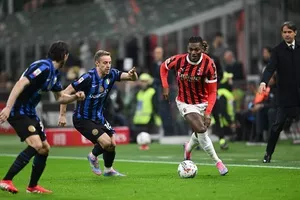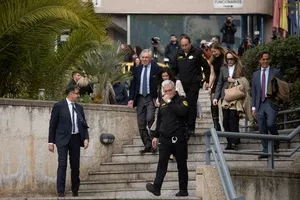On Sunday, November 3, a group of six regulars on Sydney’s Italian community arts scene will perform a selection of De Andrè’s much-loved music, in occasion of the 20th anniversary of his death.
The group, consisting of Nadia Piave, Jess Ciampa, Gino Pengue, Mauro Colombis, Emilio Lomonaco and Danilo Sidari, will see the three vocalists Piave, Sidari and Lomonaco alternate songs while accompanied by the other musicians.
The performers previously worked together last year, in a spectacular tribute show held in honour of Italian singer-songwriter Lucio Battisti.
That event, which was also held at Camelot Lounge, saw the venue reach full-house capacity and the show receive resounding applause.
“The most beautiful thing that happened during that show was that a lot of the audience sang along with us,” Sidari recalled.
Now, the artists are back with a performance which is sure to be just as successful as the last.
A poet, a chansonnier, a troubadour, a storyteller... The great De Andrè, known as Faber to his friends, was one of Italy’s most popular and critically acclaimed singer-songwriters of the 1960s and 1970s.
De Andrè was known for giving voice to the marginalised, the outcast and the rebellious, with songs like La Canzone di Marinella (Marinella’s Song), based on the true story of Maria Boccuzzi, a ballerina and prostitute who was found dead in the Olona river in Milan in 1953, and Amico Fragile (Fragile Friend), a piece which Sidari said is “possibly the song which best represents De Andrè”.
According to Sidari, Amico Fragile was written after a party in one of the exclusive clubs on the Emerald Coast in Sardinia, where De Andrè had been invited to play.
Unimpressed with the party, De Andrè allegedly left, slamming the door and wondering why no one dared to speak about the real issues in Italy.
Back home, he wrote Amico Fragile, a song which Sidari said “is certainly very sarcastic, and which denounces some of the habits and attitudes of the Italian bourgeoisie”.
Sidari said that De Andrè is important in the history of Italian music for “more than one reason”.
Firstly, because he was a poet, and today the words to some of his songs are published in Italian written anthologies.
Secondly, De Andrè incorporated instruments from Italian, Middle Eastern and North African traditions into his music, after extensive sonorous research.
Thirdly, because he used dialect in his songs, a choice which Sidari said “put to the attention of the public the use of dialect, which had disappeared from public use since the end of the ‘50s...”
De Andrè, who was from Genoa and sometimes sang in Genovese dialect, brought the music back to the common people by using a language which was used on the street, in the house, and among friends or family.
Finally, Sidari said that De Andrè made a great impact on Italians because he was a genuine person who demonstrated consistency between his public face and his private beliefs, as he sang and spoke for the rights of all people.
De Andrè succumbed to lung cancer in January, 1999.
A bourgeois who denounced the hypocrisies of bourgeois living, he combined poetry with politics to create an astounding discography which extended across four decades.
De Andrè was never afraid to show his true colours, and it is perhaps this which carved him out a profound space in the history of Italian music, and why he continues to be revered and listened to by young and old alike, 20 years after his death.
‘Faber Lives: The Music of Fabrizio De Andrè’ will be held on Sunday, November 3, at Camelot Lounge, Marrickville, with doors opening at 6:00 pm and music from 7:00 pm.
Get your tickets online.




























